Chilean picarones (slightly different than Peruvian picarones) are soft, squash or pumpkin donuts that are soaked in an orange-infused syrup made with panela.
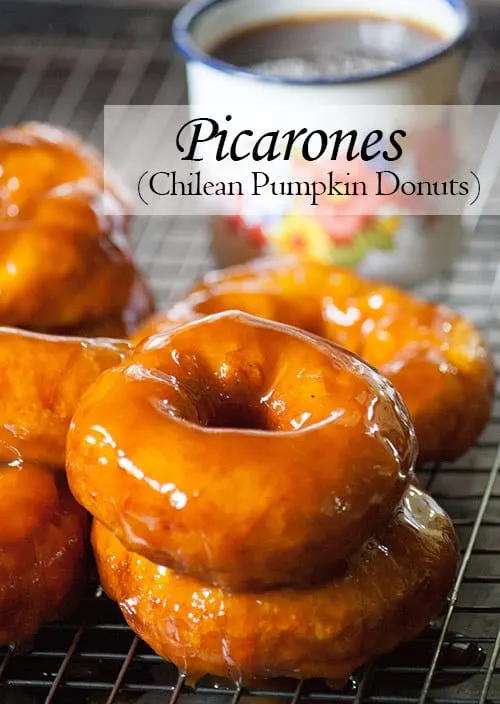 DISCLOSURE: This article contains Amazon affiliate links. These links are provided to help you find some of the more specialty products we mention in the recipe. If you make any purchase after clicking through one of our links, we receive a small commission from Amazon, at no extra cost to you. Thank you for supporting Curious Cuisiniere!
DISCLOSURE: This article contains Amazon affiliate links. These links are provided to help you find some of the more specialty products we mention in the recipe. If you make any purchase after clicking through one of our links, we receive a small commission from Amazon, at no extra cost to you. Thank you for supporting Curious Cuisiniere!
The History Of Picarones
It is said that buñuelos (fried dough) came to South America with the Spaniards. Each country then made their own version with their most common ingredients and changed their names too.
‘Picarones‘, which means ‘rascals’ or ‘naughty’, was the name the Peruvians gave them.
In Perú, picarones are made with sweet potatoes, squash, flour, anise seeds, sugar, and water. This dough is then cooked, cooled and fried. Picarones are then drizzled with panela syrup.
The Chilean troops of the Liberating Expedition of Peru (1820-1824), after occupying Lima, would hang out near a church in the neighborhood of Malambo where Rosalía sold picarones. These became a very popular snack amongst the soldiers.
Years later, Rosalía married Pedro Olivos, a Chilean soldier, and went back with him to live in Santiago, Chile where she continued selling picarones.
Once in Chile, the recipe changed again.
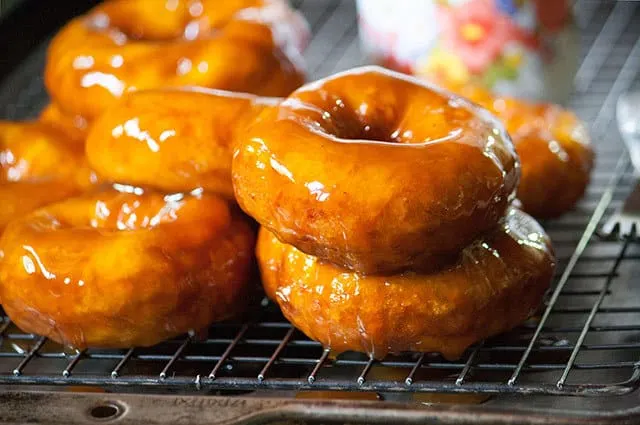
This time the sweet potatoes and anise seeds were omitted and instead of adding a drizzle of syrup, the syrup became a thick, orange-infused syrup/sauce for soaking the donut.
Chilean picarones are very popular during the winter or rainy days, a great snack that you can find on the street next to sopaipillas (round, fried dough) and churros.
They are served with a cup of coffee in the afternoons.
Making A Puree For Squash Or Pumpkin Donuts
Chileans use squash to make these donuts, as it is more common than pumpkin. Butternut squash is slightly sweeter than other squashes and is very often used to make picarones.
How to make pumpkin or squash puree, three ways.
- In the microwave: Wrap a piece of squash with plastic wrap, poke it with a fork a few times and microwave it for about 5 to 8 minutes, stopping after 4 minutes to check if it’s done. Let it cool down completely, scoop out the flesh and mash it with a fork.
- Baked: Pre-heat the oven to 400F. Brush a few pieces of squash with vegetable oil and bake on a try for about 30 minutes or until soft. Scoop out the flesh and mash it with a fork.
- Stovetop: To a big saucepan add squash pieces and cook until tender. About 15 minutes. Set squash on the counter and scoop out the flesh. Mash it with a fork.
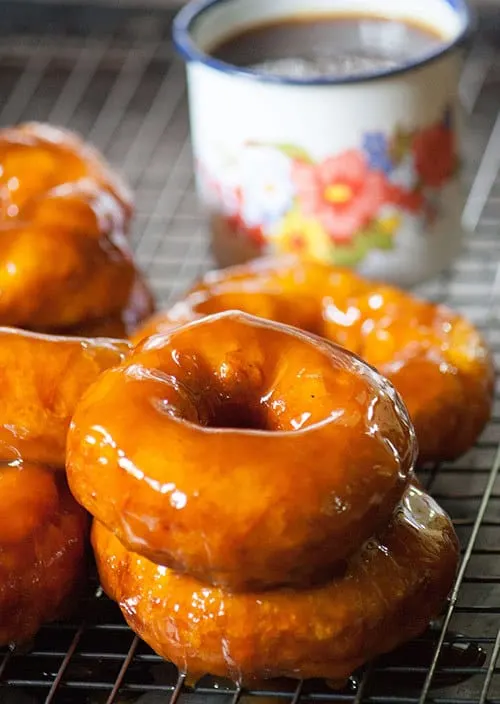
How To Make Picarones
There are 2 ways of making picarones.
One, the dough uses baking powder as a leavening agent, and the other way is by adding yeast.
For our recipe today, I’m using yeast.
It’s important that all your ingredients are at room temperature before you begin making your dough, and that you use a big bowl to mix it.
The dough is very sticky, so you’ll need to mix it with a wooden spoon. After mixing, let it rest at room temperature until it doubles in size.
This dough can be made a day before. Make the dough and keep it in the refrigerator until ready to use. The dough will rise in the fridge.
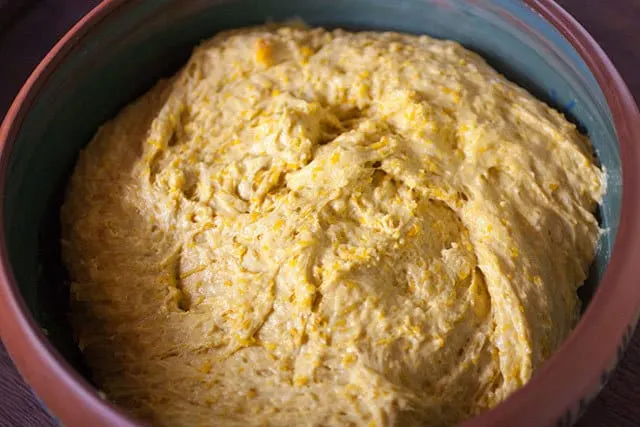
How To Shape And Fry Picarones Donuts
Once your dough is ready. Get out a big frying pan and heat some oil on medium/low.
As you see, two donuts don’t have the same shape or size, this is because you are shaping each one by hand.
To make them almost the same size, use an ice cream scoop or a 1/4 measuring cup.
Get a small bowl with flour and flour the measuring cup or the ice cream scoop and scoop some dough.
Flour your hands and try to roll the dough into a ball between your palms, as much as you can. Flour your thumbs and poke a hole in the middle creating a donut.
Place the shaped donut carefully into the hot oil and repeat with the rest of the dough.
The Orange Glaze For Picarones
The glaze, or syrup, for picarones uses panela (or dark brown sugar), orange zest, and cloves to give it a bright and deep flavor.
After frying, picarones are then soaked in the thick syrup and served warm with lots more syrup.
Grab a cup of coffee and enjoy!
Picarones (Chilean Pumpkin Donuts)
Ingredients
- 2 cups squash or pumpkin puree
- 1/3 cup sugar
- 1 1/4 cups milk, at room temperature
- 2 teaspoon active dry yeast
- 3 cups unbleached all-purpose flour
- 3 cups vegetable oil (for frying)
For The Syrup
- 3 cups water
- 2 cups shredded panela, dark muscovado sugar, or dark brown sugar
- Zest of one orange
- 4 whole cloves
- 3 tablespoons cornstarch
Instructions
For The Dough
- In a big bowl, mix squash or pumpkin puree, sugar, milk and yeast.
- Add flour and mix well. The dough is very sticky. Cover the bowl and leave it to rise for an hour and a half at room temperature.
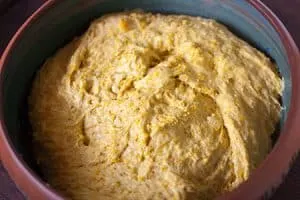
For The Syrup
- In a medium saucepan, add all the ingredients for the syrup. Cook over low heat, whisking constantly, for about 5 minutes. Keep warm.
To Make The Donuts
- Heat 3-4 inches of oil in a deep saucepan over medium/low heat.
- Flour a ¼ measuring cup and scoop out some dough. Flour your hands, shape the dough into a ball. Using your thumbs, poke a hole through the center of the ball to create a donut shape.
- Place donut on hot oil and fry for about 3 minutes on each side.
- Remove the donut from the hot oil and drain on paper towels. Continue with the remaining dough.
- Soak the fried donuts in the hot syrup.
- Serve them while they are still warm.
If you liked this recipe, here are some similar dishes you may enjoy!

Lizet is Bolivian and lives in Paraguay. Through friends and travel she has developed her love of food. From Africa to Asia, Europe to the Americas, there is always something new to try when you come to dinner. You can find more of Lizet’s tasty creations on her website ChipaByTheDozen.com. You can also find her on Instagram and Facebook.
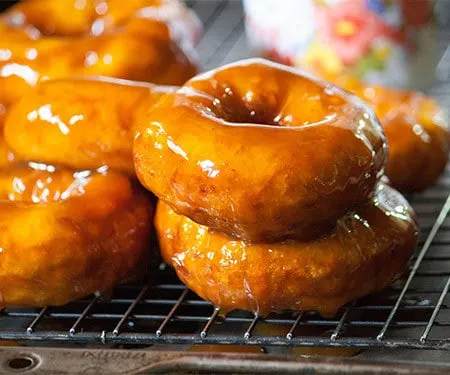
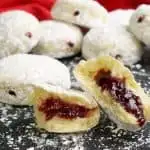
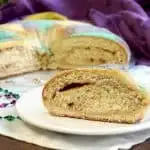
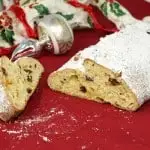
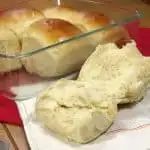
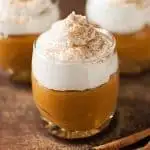
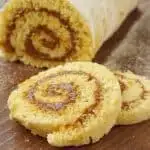
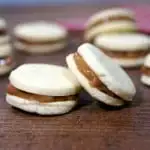
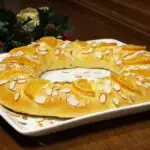
dots
Tuesday 7th of January 2025
i used homemade pumpkin puree that was a bit wet. as a result my dough was rather loose so i did not bother to shape it into rings, i simply used icecream scoop to make small balls of dough. the ones fried for longer were definitely the best. i think they would have been better as thinner rings but i am not skilled enough to shape such delicate dough. maybe next time! thank you for the recipe.
Sarah - Curious Cuisiniere
Friday 17th of January 2025
From our experience making and working with homemade pumpkin puree, it is typically much more wet than canned pumpkin puree. So it makes sense that using homemade pumpkin puree you dough would be a bit loose. If doing so in the future, I would have added more flour or, better yet, reduced the milk. It sounds like you were able to modify you cooking for the dough you had, and we're glad you enjoyed them anyway!
Mim
Saturday 7th of December 2024
Are the measurements correct? Trying the recipe now and need help. It’s more like a batter and I can’t imagine handling it with my hands. Please assist.
Sarah - Curious Cuisiniere
Wednesday 11th of December 2024
Hi Mim. This is a sticky dough. However, if you use well-floured hands, you should be able to shape it.
Paul
Monday 4th of October 2021
I read the article and its still unclear to me what the origin of picarones actually is. I think it is African.
Sarah Ozimek
Thursday 14th of October 2021
Hi Paul. From what we can find, the concept came from the Spanish to Peru. From Peru it traveled to Chile via the soldiers.
Yasmin
Saturday 25th of July 2020
Thank you for sharing this recipe, they turned out wonderful. I will say that picarones are not for beginner cooks. There is skill in forming the dough as is very sticky and difficult to work with. Is better is you cook with someone experienced in the kitchen. This dessert reminded me so much of my grandmother.....oh how much I miss her wonderful cooking. God bless you
Sarah Ozimek
Saturday 25th of July 2020
Thank you Yasmin. And thank you for your tip. So glad we could bring back some good memories!
Cassondra
Monday 20th of July 2020
I tried another recipe on here inspired by Chile and it was delicious but oh my goodness these were awful! Ha, thanks for letting us experiment!
Sarah Ozimek
Wednesday 22nd of July 2020
Hi Cassondra. Could you elaborate on why you didn't like them? Flavor preference? Did they not turn out for you? Something else? Thanks!